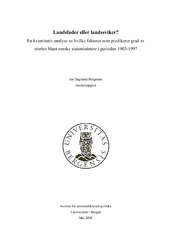Landsfader eller landssviker? En kvantitativ analyse av hvilke faktorer som predikerer grad av storhet blant norske statsministere i perioden 1905-1997
Master thesis
Permanent lenke
https://hdl.handle.net/1956/3085Utgivelsesdato
2008Metadata
Vis full innførselSamlinger
Sammendrag
In the US there are numerous studies on presidential greatness. It started in 1948 when thehistorian Arthur M. Schlesinger asked 55 of the leading American historians to rate all thepresidents, starting from George Washington, on a scale from 1 to 5. The result waspublished in Life Magazine in 1949 and became heavily debated. Since then there have beenundertaken many analyses concerning which factors predict presidential greatness. Years inthe presidency, war years and presidential scandals are generally seen as significantpredictors on presidential greatness in the US. Which variables predict greatness among 25prime ministers in Norway between 1905-1997? Such quantitative analyses have never beenundertaken, and therefore this study focuses on a wide approach using multiple regressionand OLS method. The data are mainly collected from the Norwegian Bureau of Statistics andNorsk samfunnsvitenskapelig datatjenteste. Of the 21 included independent variables,divided into groups of institutional, socioeconomic and biographical factors, months asprime ministers and unemployment were found to be significant variables in predictinggreatness. These factors account for 53 percent of the variation in greatness. Months asprime ministers was the most important factor in predicting greatness. By studying theresiduals it was revealed that some prime ministers did not fit into the model. ChristianMichelsen, who led the country when it came independent from Sweden in 1905, washeavily underpredicted, probably because the respondents emphasized this event when ratinghim great.
Utgiver
The University of BergenOpphavsrett
The authorCopyright the author. All rights reserved
